Current as of: January 1, 2026 - 06:36
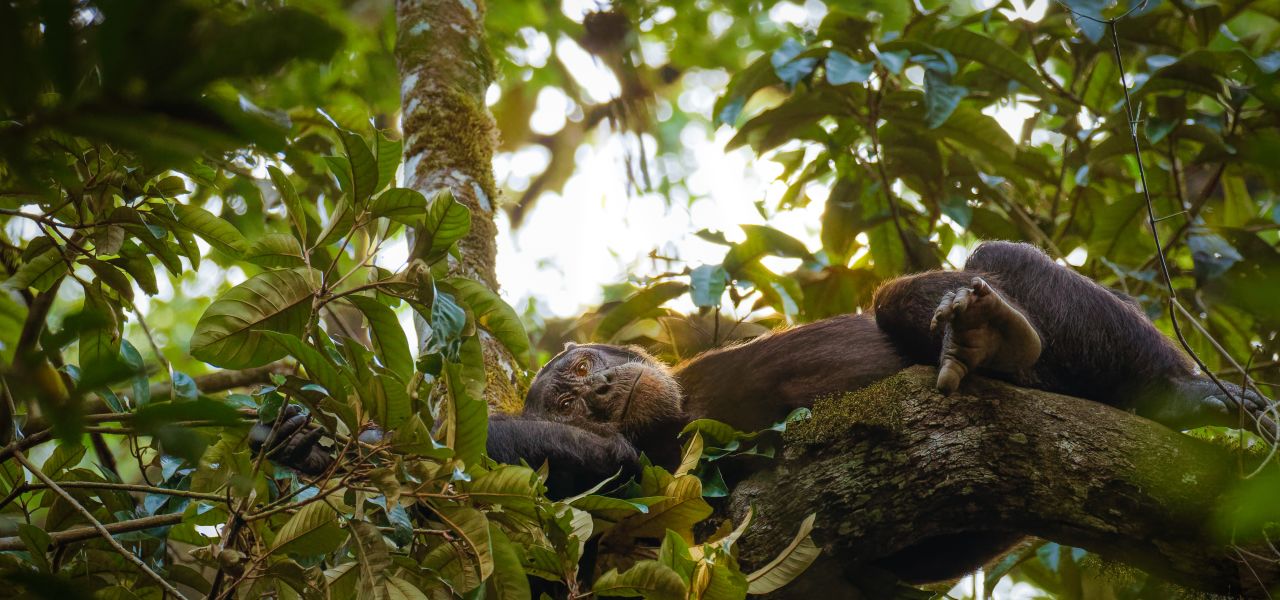
Chimps & Gorillas of Uganda Trip Notes
- Ways to Travel: Guided Group
- Destination: Uganda
- Programmes: Wildlife
-
Activity Level:
2 out of 7 - Easy & Moderate
- 11 Days: Land Only
- Ages: 16+
- Trip Code: WQU
- Carbon Footprint: 66kg CO2e
Trip Overview
Discover the emblematic wildlife of Kibale Forest, Lake Mburo National Park and Bwindi Impenetrable Forest
Uganda is a nature documentary come true. Get the best seat in the house on this true adventure into the heart of Africa. Kibale Forest is possibly the best place in the world to track chimpanzees, while Lake Mburo National Park is home to zebras, giraffes and the elusive leopard. In Bwindi, we hike through thick vegetation with expert guides to spend an hour with mountain gorillas – one of the great wildlife-watching experiences.
At a Glance
- Accommodation: 10 Classic nights (hotels/lodges)
- Travel by specially designed 4×4 vehicles
- Group normally 4 to 14, plus leader. Minimum age: 16
Highlights
- Discover Uganda’s incredible wildlife with the guides who know them best
- Track chimpanzees and other primates in Kibale Forest with an expert local guide
- Trek through Bwindi Impenetrable Forest to spend an unforgettable hour with mountain gorillas
- Game drive in Lake Mburo National Park, home to zebras, giraffes and impala
Is This Trip for You?
This trip is graded Activity Level 2 (Easy & Moderate) with a Wildlife Rating of Four. For more information on our trip gradings please visit the Activity Level Guidelines page or our Wildlife Holidays page for more on our Wildlife Ratings. If you have any queries about the difficulty of the trip please do not hesitate to contact us.
The Moderate grade applies specifically to the gorilla and chimp treks, the rest of the itinerary is graded Easy. Reasonable fitness is required for chimpanzee and gorilla tracking.
Gorilla trek: Owing to the terrain and the need to explore to find gorillas, the trek doesn’t follow a path in Bwindi Impenetrable Forest; instead, the guides cut a route through the undergrowth. Expect a minimum of three hours of walking on rough terrain, with the possibility of climbing up to 8,553ft (2,607m); steep ascents and descents over muddy slopes are the norm. Strong footwear is essential and we recommend hiring a local porter to help you carry your bag/camera equipment and provide a steady, supportive hand (porters are arranged and paid for locally on the day).
This is a busy and active trip with some early starts as we explore as much as we can of this wonderful country. There are some long drives, sometimes on bad roads, but we use comfortable safari vehicles and the fantastic scenery does make time on the drives go by.
Booking conditions
At the time of booking, a £900 (or equivalent in booking currency) non-refundable deposit is required to cover the cost of the gorilla permit and a £260 (or equivalent in booking currency) non-refundable deposit is required to cover the cost of the chimp permit. If for any reason we are unable to secure the permits and must cancel the trip, you receive a full refund.
If you would like a second gorilla or chimp trek, please request this at time of booking, an extra deposit is required. However, we only request the extra permits once the trip has been guaranteed as, otherwise, they must be paid in full even if the trip doesn’t run. Once the extra gorilla or chimp permits have been requested, the deposits are non-refundable.
Water safety: This trip includes time by a lake, river or sea, where there may be opportunities to swim. You should always seek local advice before deciding whether to swim. Open-water or wild swim spots should be treated with extreme caution. Information on how to keep yourself safe while swimming is shown here.
Adult min age: 16
Min group size: 4
Max group size: 14
Itinerary
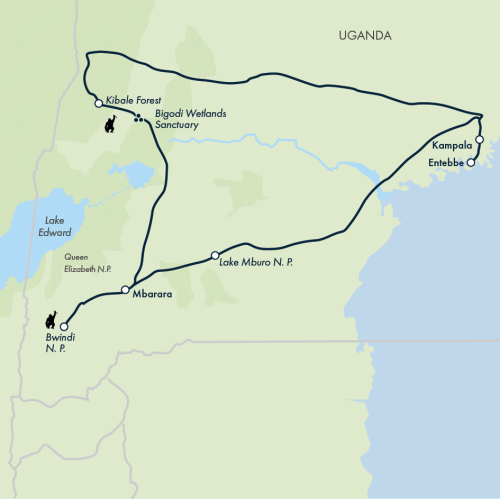
Land Only
- Start City: Entebbe
- End City: Entebbe
Land Only Itinerary
Our adventure begins in Entebbe, a city on the north shore of Lake Victoria, the largest lake in Africa. Today is all about settling in after your journey, so head to the hotel and relax for the evening.
Accommodation: 2 Friends Hotel, Papyrus Guest House or Boma Hotel (or similar)
Upgrade to a lake-view room at the 2 Friends Hotel – speak to your sales representative for more details

This morning, we have breakfast and your leader will run a welcome brief before we leave Entebbe. The drive time depends, in large part, on traffic in Kampala but should take approximately seven hours.
Upon arrival, we can relax at our lakeside lodge. Kibale Forest National Park is home to 13 primate species: there are nine diurnal primates, including vervet, red-tailed, L’Hoest’s, red colobus, black-and-white colobus and blue monkeys, plus grey-cheeked mangabey, olive baboons and, the most famous of all, chimpanzees. Although chimp sightings are not guaranteed, the odds of encountering them are very good.
Accommodation: Turaco Treetops (or similar)
Upgrade to a luxury cottage today – speak to your sales representative for more details
After an early breakfast, we head into the depths of the lush, green Kibale Forest in search of chimpanzees. While trekking, we are surrounded by birdsong and can expect to see at least five or six types of primates, most probably grey-cheeked mangabeys, red-tailed monkeys and, of course, chimpanzees. The walking is fairly easy with well-maintained trails and reasonably flat terrain. Leaving the forest, you’re welcome to enjoy a coffee at Cafe Kibale, a wonderful cafe providing free hospitality training to young people from the surrounding communities.
After an incredible morning, we head back to our accommodation for lunch, before a 10-minute drive to the Bigodi Wetlands Sanctuary in the Magombe wetland. The sanctuary is a major tourist attraction in the Kibale Forest area and is operated by the Kibale Association for Rural and Environmental Development, a community-based organisation. It’s also a natural haven for birds and other monkeys, such as vervets, olive baboons, and colobus monkeys, which we hope to spot with the help of our community guide.
Accommodation: Turaco Treetops (or similar)
Upgrade to a luxury cottage today – speak to your sales representative for more details
There is the option of doing a second chimp trek this morning to increase the probability of seeing them (due to limited permit availability, we recommend you prebook the second chimp trek).
In the afternoon, we embark on the Crater Lakes hike around Kibale National Park. This two to three-hour tour offers the chance to explore the beautiful crater lakes at the edge of Kibale.
Accommodation: Turaco Treetops (or similar)
Upgrade to a luxury cottage today – speak to your sales representative for more details
Today we drive to Bwindi National Park, which takes approximately seven to eight hours. We stop for a picnic lunch en route, before continuing through Kamwenge Rukungiri to get to Bwindi.
Accommodation: Haven Lodge Buhoma/Ride 4 a Woman (or similar)

A day to relax before we go in search of gorillas! You have the opportunity to join an optional activity (see Extra Expenses for prices). These include the Batwa experience, a three to four-hour cultural experience, in which you can learn about the lives of the indigenous Batwa people, a forest walk, or the Ride 4 a Woman community experience. We also enjoy a picnic lunch today.
Accommodation: Haven Lodge Buhoma (or similar)
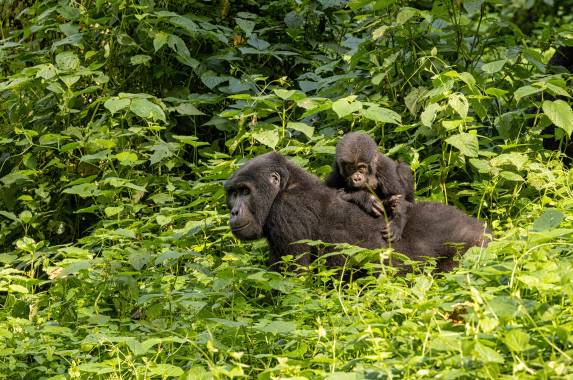
For many, observing a wild mountain gorilla is one of the most emotional wildlife experiences possible. Tracking these gentle giants can take anything from under an hour to more than six, depending on where the family is located. The number of permits allocated daily are limited so we recommend early booking. If the permits for gorilla families close to where we stay are unavailable, there are more permits for another area of the park, though this will mean a long drive to the trek start point. The trek itself can be along steep, slippery trails and through the bush so you should be in reasonable physical condition, but the rewards of spending an hour with our close cousins more than makes up for the effort of getting to them.
Accommodation: Haven Lodge Buhoma (or similar)
Today is a free day and there is the option of getting a second gorilla permit for this day, though due to the limited number of permits, this should be obtained at time of booking. For those who choose not to go on a second gorilla trek, there are other walks you can do nearby or you can relax at our lodge, reminiscing about the previous day’s encounters. On some departures, due to the availability of permits, we may have to swap these two days over with the free day (and optional second gorilla trek) on Day 6 and the included gorilla trek on Day 7 or we may have to split the group to trek with gorillas across both days.
Accommodation: Haven Lodge Buhoma (or similar)

Leaving the forests, we head towards Lake Mburo National Park. En route, we stop in Kabale near the Rwandan border for lunch. The drive should be about five hours (not including stops). Lake Mburo is the only place in southern Uganda where you can see zebras, giraffes and impala and is a great place to try to see leopards. It is also home to more than 300 bird species and offers the possibility of game walks and game drives.
Accommodation: Rwakobo Rock (or similar)
Today we go on a final game drive looking for plains wildlife. The park has a network of game tracks in the eastern part of the park passing a variety of landscapes: acacia woodland, wetlands, grassy hillsides, rocky outcrops and seasonally flooded valley floors. The early morning and late afternoon are the best times to roam the park in search of wildlife. There is also the option of tracking game on foot through the savannah and going on a boat excursion, particularly good for birdlife. You also have the option of going on an early morning game walk. Accompanied by a ranger guide, you walk to a salt lick where many animals are attracted to the salty rocks. At this time of day, you may encounter hyenas returning to their dens and hippos retreating to the lake. The lake itself is rich with a diversity of animals and plants, and these can be viewed clearly on a boat trip. These include crocodiles, hippos and birds, such as pelicans, black crakes, herons, cormorants and fish eagles, but you may also see the rare shoebill stork if you are lucky.
Accommodation: Rwakobo Rock (or similar)
Today is our final day and we return to Entebbe and the shores of Lake Victoria. The driving time depends on the amount of traffic in Kampala, but we make regular stops to break up the journey, including a picnic lunch. En route back to Entebbe, we visit Mabamba Swamp (Mabamba Bay Wetland System), which lies about 25mi (40km) from Entebbe. The swamp, said to support more than 190,000 birds, is the perfect spot in Uganda for watching the globally threatened shoebill stork and the papyrus yellow warbler.
We arrive into Entebbe in the early evening, if time permits, you guide will take you for dinner (own expense) before dropping you at the airport.
On our final day, we return to Entebbe and the shores of Lake Victoria. The driving time depends on traffic in Kampala, but we stop regularly to break up the journey. About 25mi (40km) from Entebbe, we visit Mabamba Swamp (Mabamba Bay Wetland System), which is said to support more than 190,000 birds. It’s the perfect spot in Uganda for watching the globally threatened shoebill stork and the papyrus yellow warbler. After our excursion, we also have a picnic.
We arrive into Entebbe in the early evening. If time permits, your guide will take you for dinner (own expense) before dropping you at the airport.
Accommodation
Hotels and lodges near national parks

The accommodation on this trip has been chosen to maximise your animal-watching opportunities and reduce travel time. To give you a taste of what to expect, below are some of the places we stay.
Upgrade to a lake-view room on Day 1 and a luxury cottage on Day 2, 3 and 4 of the itinerary – speak to your sales representative for more details.
Near Kibale Forest National Park: Turaco Treetops

Within 12 acres (5ha) of rainforest bordering Kibale Forest National Park, this three-star hotel is the ideal base to explore the park and trek with chimpanzees. The lodge is powered by solar power, ensuring it operates in harmony with the surroundings. The hotel has a spacious pool, lounge and restaurant plus comfortable rooms with balconies.
Buhoma: Haven Lodge Buhoma
This community-owned lodge is perfectly located close to the meeting point for the gorilla treks. There are amazing rainforest views from the terraces, and the comfortable rooms are made with local materials to blend into the surroundings.
Near Lake Mburo National Park: Rwakobo Rock
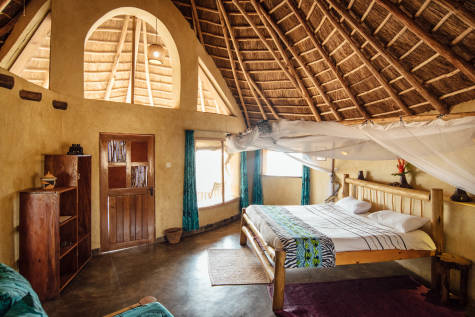
This three-star lodge is just 0.6mi (1km) from the gate of Lake Mburo National Park and each cottage is set apart to offer privacy and uninterrupted views of the park. There is a water hole beneath the dining areas so you can watch the wildlife come to drink while you enjoy dinner.
Single supplement from £ 775
Food & Drink
The service can be either à la carte or buffet, depending on the lodge. For early game drives, and to maximise the time spent in the parks, a packed breakfast or lunch may be provided in some instances. The food provided is a mix of good local and international food throughout.
It is possible to cater for vegetarians or those with special requirements; however, please make sure you advise your sales representative at time of booking.
Please note: The availability of certain specialised products for restricted diets (eg gluten-free or dairy-free) is minimal or non-existent in Uganda and we strongly recommend you bring these specialised dietary items from home.
Transport
We use comfortable 4×4 vehicles throughout the trip, normally Toyota Landcruisers or similar, with open roof hatches for optimised game viewing. Some of the drives can be quite long and some of the roads are not in the best condition, especially after the rains.
Weather & Seasonality
The wettest areas are concentrated along the shores of Lake Victoria and the western mountain districts. Although rains are normally more frequent during the two rainy seasons (April-May and October-November), wet spells can occur during the dry season, so please come prepared. Uganda can be visited at any time, the weather is pleasant for much of the year over most of the country and temperatures are never excessively high.
The temperatures are usually cooler at night and this depends more on the altitude than on the actual area of the country.
Joining Instructions
Getting to the start hotel
Our start hotel is approximately 15 minutes from Entebbe International Airport (EBB). We provide one group transfer from the airport to the hotel, which you can join at no extra cost, provided you can be at the airport before the transfer leaves. Speak to your sales representative for the transfer times or to arrange a private transfer.
Catching your return flight
The group returns to Entebbe at approximately 6pm. If your flight departs between 8pm and 10pm, you will be dropped at the airport before dinner. If you are on the later flight, you will be transferred to the airport after dinner. Please do not book flights departing before 8pm.
Full joining instructions including local emergency numbers will be sent to you as part of our Final Joining Instructions. If you do not receive these at least a week before departure, or require them earlier please contact our office or your travel agent.
Location start: Entebbe
Location end: Entebbe
What To Take
Essential Equipment
We encounter a range of temperatures on this trip. Most of the time, light cotton clothing is most comfortable, but bring a fleece jacket for early morning game drives and for the evening.
You also need:
- Raincoat
- Waterproof trousers (pants)
- Fleece or sweater
- Hiking boots
- Insect repellent
- Sunscreen
- Binoculars
- Head torch (headlamp)
- Water bottle
- Trekking poles
- Drybags for forest hikes
- Long-sleeve pants and shirts
- Swimwear
- Gloves: for the gorilla trek as there can be stinging and sharp vegetation on the trek. Cheap gardening gloves are fine
- Neutral-coloured clothes for gorilla treks
Please use soft-sided bags rather than suitcases or bags with wheels as there is only limited luggage space on the vehicles.
Important note: Smoking is prohibited in all public places, workplaces, transport and other outdoor places within 165ft (50m) of a public place. Electronic cigarettes and shisha (water-pipe tobacco) are banned. There are penalties including fines and/or imprisonment.
Water included
Plastic bottles are a big issue in many countries where recycling isn’t yet widely available; they often end up in landfill sites or get burnt, both processes are harmful to the environment and we would like to reduce our impact here. On this trip, water will be included in large containers to try to reduce the amount of plastic produced. Whenever possible, we try to provide water in large bottles; however, at times we may need to use slightly smaller bottles instead. Please add a water bottle to your packing list!
Practical Information
Visa
Uganda
Travellers from the UK, US and EU normally need a visa to enter Uganda. Please note, visa requirements often change and it is your responsibility to obtain any required visas for this trip. Therefore, we recommend that you check with the nearest embassy or consulate of your chosen destination(s), including any countries you may be transiting or transferring through.
Some local governments provide guidance on what visas their citizens need. To help, we’ve gathered a selection of useful links below.
- Australia: www.smartraveller.gov.au/destinations/africa/uganda
- Canada: www.travel.gc.ca/destinations/uganda
- United Kingdom: www.gov.uk/foreign-travel-advice/uganda/entry-requirements
- USA: www.travel.state.gov/content/travel/en/international-travel/International-Travel-Country-Information-Pages/Uganda.html
You can apply for your visa (or find out more information) at www.visas.immigration.go.ug. The decision taken on the application will be sent electronically through the email provided by the applicant. If approved, an approval letter will be sent as an attachment to the email provided. Print it out and present it together with a valid passport/travel document at the port of entry. The cost of a standard single-entry visit visa is US$50 and can be paid online.
Please note: Currently, the single-entry visa is only valid for three months from the issue data. Please ensure your visa is valid for your travel dates.
If after visiting Uganda, you will also travel to Rwanda and Kenya, you may apply for an East African Visa, which covers all three countries. Please contact the Ugandan High Commission to obtain more information about the combined visa from Uganda.
Vaccinations and Health
Uganda
Vaccination against yellow fever is necessary and you must bring a valid certificate of vaccination. You may also want to consider vaccinations for hepatitis A, polio, tetanus, typhoid, cholera, hepatitis B, meningococcal disease, rabies and tuberculosis. Malaria prophylaxis is essential. Please seek advice from your doctor or travel clinic on the best course of action for all the above.
Additionally, bilharzia is known to occur in some of the lakes or rivers visited on this itinerary, we therefore advise all to take advice from your guide or leader locally before venturing for a swim. Zika fever, a mosquito‐borne viral disease, is also a known risk in places visited on this trip. There is currently no vaccine or prophylaxis available, we therefore strongly recommend you take the usual precautions to avoid mosquito bites.
Methanol: The FCDO warns travellers to be cautious of methanol poisoning when travelling in destinations visited on the trip.
Malaria prophylaxis is essential on this trip, and we suggest that you seek advice from your GP or travel health clinic about which malaria tablets to take.
Bilharzia is known to occur in some of the lakes or rivers visited on this itinerary, we therefore advise all to take advice from your guide or leader locally before venturing for a swim.
Dengue fever and/or chikungunya are known risks in places visited on this trip. Both are tropical viral diseases spread by daytime biting mosquitoes. There is currently no vaccine or prophylaxis available for either, and therefore the best form of prevention is to avoid being bitten. We recommend you take the usual precautions to avoid mosquito bites.
Local Time
Uganda's time zone: Africa/Kampala (UTC +03:00)
Electricity
Uganda's electricity: Plug type G (three rectangular pins) – 240V, 50Hz
Money
Uganda's currency: Ugandan shilling (UGX)
ATM Availability
ATMs are fairly uncommon in Uganda, there is one at the airport and Entebbe but these are not reliable and often do not work.
We recommend you take most of your money in US dollars cash – good condition notes issued from 2006 or later with the big head design. Bring a sensible mix of denominations. Credit cards are not widely used except in Kampala.
It is then best to change money in town on arrival. Larger denomination bills receive a better exchange rate.
Shillings may not be imported or exported. There is no restriction on the import of foreign currency provided it is declared on arrival. It is difficult legally to reconvert shillings into hard currency.
Extra Expenses & Spending Money
As all meals are included on this trip (except dinner on the first and final nights in Entebbe), there are few extra expenses. Water is provided on the vehicles; however, allow some extra cash for soft drinks, beer and wine.
You can hire a porter for the gorilla trek (US$20 and US$5 tip) to carry heavy camera equipment or help you on slippery trails. You may also wish to buy some souvenirs – both are good ways to support the local communities.
Optional excursions:
- Second chimp tracking in Kibale Forest: From £248/US$315 or equivalent in booking currency (to be booked in advance)
- Second gorilla tracking in Bwindi National Park: From £785/US$860 or equivalent in booking currency (to be booked in advance)
- Forest walk in Bwindi: Approximately 146,000 shillings (US$40) for the park entrance and approximately 146,000 shillings (US$40) for the guide (three hours)
- Guided village walk in Bwindi: 110,000 shillings (US$30)
- Optional game walk in Lake Mburo : 110,000 shillings (US$30)
- Optional boat safari in Lake Mburo: 110,000 shillings (US$30) – needs a minimum of four people to operate
Please note, the above optional excursions, which are managed by the Uganda Wildlife Authority, can only be booked with a card payment.
- Batwa experience (Day 6): 10,335 shillings (US$80)
- Forest walk (Day 6): 11,625 shillings (US$90)
- Ride 4 a Woman community experience (Day 6): 3,875 shillings (US$30)
Tipping
Our local staff are paid fairly for their work. You may feel your leader has performed well over the course of your time in Uganda and want to show your appreciation of their services. If you would like to tip your leader, we suggest a figure of approximately 19,000 shillings (US$5) per person per day.
It is also courtesy to tip any local guides, lodges, porters and/or boat staff you may have over the course of the trip, though certainly not compulsory. We suggest budgeting approximately 183,000 shillings (US$50) per person for these.
We advise clients to exchange US$150-US$200 for tipping and general expenses, any unused shillings can be exchanged at the end of the trip.
Sustainability and Impact
As a certified B Corp, we’re on a mission to improve our social and environmental impact across all our adventures.
We do this through our innovative Thriving Nature, Thriving People plan.
This ‘nature positive’ approach is designed to help nature and communities thrive in harmony through practical solutions, such as reducing carbon and waste on our trips, supporting conservation projects through the Exodus Adventure Travels Foundation, and rewilding 100 square metres for every Exodus traveller.
Non-refundable items in the event of customer cancellation
If you choose to cancel your trip, the standard cancellation fees are shown in our Booking Conditions. However, there are additional fees for extra non-refundable items for this trip, and these are detailed below. For more information, see Section 4 of the Exodus Booking Conditions. If you are booking your flight through us, your sales representative may also confirm separate cancellation terms related to your international flights at the time of booking.
Cancellation at any time prior to departure:
- Gorilla permits: £900
- Chimp permits: £260
Costs are accurate at time of writing in September 2023
Important Information
Your Safe Participation
When booking this trip, you should be confident in your ability to participate in all activities described in these Trip Notes. If you have any doubt about your suitability, please call us and ask to speak to one of the experts on this itinerary.
Although our leaders are well trained to deal with different capabilities, if they have any concerns about someone’s ability to safely take part in an activity, or their impact on other people’s enjoyment, we authorise them to take necessary action which, in some circumstances, may involve asking someone to miss that activity.
By booking this trip you agree to our Booking Conditions which clearly state that our leaders have the authority to do this. In these rare instances we will ensure anyone sitting out is safely provided for and offered alternative options where possible. Refunds will not be provided for activities missed and customers may be liable for additional costs incurred.
Seatbelts
All vehicles used by us should be equipped with working seatbelts, except where approved by us based on the vehicle type or journey. Wherever seatbelts are available, we require our customers to use them for their own safety, even where it may not be a legal requirement.
Travel Safety
For additional information please have a look at the travel safety advice page on our website.
How to Book
Speak to our friendly team of experts to plan your adventure:
- Check availability: our website shows real-time availability of our guided group tours, or contact our team by phone, email or live chat.
- Hold a space: You can provisionally hold a space on any guided group tour to give you time to finalise your travel plans.
- Confirm your booking: Payment of a deposit will complete your booking and secure your place on the trip.
After booking
You will receive a confirmation document and invoice, which includes extra information and guidance about your travel arrangements. Our dedicated Customer Operations team will help you with any pre-travel questions or arrangements and can easily add extensions or extra accommodation to your booking. Final Joining Instructions will usually be sent out two to three weeks prior to departure.
Adding transfers to your booking
If you have arranged your own flights and would like to add transfers to your booking, please provide your arrival and departure details to our Customer Operations team around four to six weeks before departure.
- Where free transfers are included, they are available for any flight but can only be added to your booking once we have received your flight schedule.
- Where group arrival and departure transfers are available, these operate at fixed times. You will need to arrive in time to meet the scheduled transfer. If the timings don’t align with your travel plans, our team can arrange private transfers once they receive your flight schedule.
Trip Note validity
Trip notes may be updated after booking; if any updates significantly impact the inclusions or itinerary you will be advised in writing. A link to the most up-to-date Trip Notes will be sent out with your Final Joining Instructions before departure.
The information in these Trip Notes is given in good faith. All holidays can be subject to unexpected changes, and occasionally it may not be possible to follow the itinerary as planned. In these circumstances we will make the best-possible alternative arrangements that maintain the integrity of the original itinerary.

